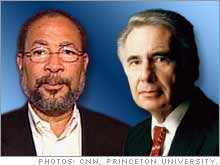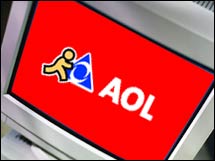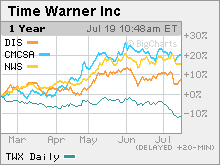Time (Warner) goes by slowly The world's largest media company remains stuck in an AOL-induced rut. Still, some big shareholders are keeping the faith...for now. NEW YORK (CNNMoney.com) -- When Carl Icahn tried to force Time Warner to split into four companies in February, it was easy to suggest that Icahn was being unfair in his criticism of the media giant. Most media stocks were mired in a months-long funk at the time so why target Time Warner (Charts) specifically? Many big investors in Time Warner shared that sentiment; Icahn failed to get enough support from large institutional owners and wound up settling with Time Warner just a week and a half after proposing the break up.
But a lot has changed since February. Walt Disney's (Charts) stock is up 10 percent on enthusiasm about strong results from its ABC network and movie studios. News Corp. (Charts) has surged 21 percent, also due to a healthy TV and movie business as well as some little Web site called MySpace. CBS (Charts), often viewed (perhaps unfairly) as the stodgiest of media firms, has even gained 7 percent. Then there's Comcast (Charts), Time Warner's biggest cable rival. Shares have skyrocketed 31 percent since mid-February thanks to strong subscriber gains for its digital phone and high-speed Internet services. Time Warner, however, has not joined the media sector's recent resurgence. Shares have tumbled 8 percent since the Icahn settlement. (Time Warner is the parent company of CNNMoney.com.) Time marches on... Surprisingly though, several big shareholders said they still have faith in Time Warner...but they are discouraged. "We are frustrated about the stock price and would urge management to continue to be proactive about enhancing value," said David Katz, president of Matrix Asset Advisors, which owns 3.1 million shares of Time Warner, including a stake in the Matrix Advisors Value fund. To be sure, Time Warner hasn't exactly sat idly by during the past few months. As part of the settlement with Icahn, Time Warner agreed to up its share repurchase program to $20 billion, a move that Katz applauds. In addition to boosting the buyback, Time Warner sold its book publishing unit to French firm Lagardere, merged its WB TV network with CBS's UPN to create the CW and agreed to buy the 50 percent stake in cable network Court TV that it did not already own from Liberty Media. It also is in the process of completing its joint deal with Comcast to buy the assets of bankrupt cable provider Adelphia, a move that should free Time Warner to sell a portion of its cable unit to the public. But none of that has mattered to investors. What Wall Street is waiting for is a firm plan about what Time Warner intends to do with its struggling AOL unit. ...but AOL needs to be fixed Even though search king Google (Charts) recently purchased a 5 percent stake in AOL for $1 billion and AOL has seen online advertising sales pick up, that has not been enough to offset declining revenue from its mainstay Internet access business as dial-up subscribers continue to drop AOL. For this reason, Time Warner is said to be considering several plans to reignite growth at AOL, including lowering the price or even giving away Internet access and supporting that business through online ads. According to several published reports, Time Warner could lose up to $2 billion in sales through such a plan but could offset some of this by increased online ads and lower costs. Time Warner said in a statement in early July though that media speculation about AOL "appear to be based on unauthorized disclosures, including of incomplete and largely erroneous financial information." The company plans to detail AOL's future strategy on August 2 in a meeting after it announces second quarter results for all Time Warner. Time Warner spokeswoman Susan Duffy said in mid-July that the company would not issue any further comment about AOL until August 2. But news about what's next for AOL couldn't come soon enough for Time Warner shareholders. "We're concerned about Time Warner but we still like it," said Edward Maraccini, co-manager of the JohnsonFamily Large Cap Value fund, which owns about 127,000 shares of the stock. "We'll be on the look out for announcements about AOL. We're not sure what they could do with it but it could continue to be a source of cash flow." Maintaining the status quo at AOL and milking its declining subscriber base probably won't appease investors though. "AOL is in a quandary. Hopefully since they are in bed with Google, they could replace a lot of the dial-up revenues by getting more online advertising sales and cutting costs," said James McGlynn, manager of the Summit Everest fund, which owns about 90,000 shares of Time Warner. But McGlynn says that it's still uncertain just how AOL will be able to make money from many other products, such as its popular AOL Instant Messenger (AIM) service. "You don't have to be an AOL subscriber to use it so how will AOL benefit from AIM? There has been a lot of talk about trying to make AIM like a MySpace but not a lot of results," McGlynn said. Value stock or value trap? Other investors hope that a firm plan about AOL will finally get investors to pay attention to Time Warner businesses that are doing well, such as cable and the network television business. "There is a disconnect between the stock price and Time Warner's intrinsic value. Clearly AOL is an overhang psychologically," said Katz. Still, even though Icahn has backed off from his call to split up Time Warner, one hedge fund manager who owns the stock said that as long as Time Warner's stock continues to founder, there will be some who think that a break up could solve the company's problems. "There are jewels inside of Time Warner," said Morris Mark, president of Mark Asset Management, a hedge fund that owned about 612,000 shares of Time Warner as of the end of the first quarter. "But there are a lot of businesses stuck together that are fairly independent." Mark said that he thinks the big reason Time Warner has underperformed rivals such as Disney, News Corp. and Comcast is not AOL but because the company has not been able to prove to Wall Street that all of its disparate parts really fit together. He also said that the company has taken too long to take steps to fix AOL. "Look at the decision to open up AOL more aggressively for example. I don't think Rupert Murdoch would have had a committee meeting. He would have just done it," said Mark, referring to News Corp.'s headstrong CEO. Despite this, many shareholders are still finding it difficult to let go of Time Warner stock. "The two things that people have been worrying about for years are AOL and cable. Finally we think we are about to know what's going to happen with both so why give up now?" said McGlynn. And even Mark conceded that he thinks Time Warner stock is too cheap to bail on. "It is sort of a bete noire but we're going to hold on to this and try and wait it out," Mark said. But management will need to impress Wall Street with its AOL plans on August 2 if it hopes to maintain the loyalty of its shareholders. Patience is wearing thin. -------------------------------------------------------------- Related: AOL as Yahoo wannabe Related: Icahn and Time Warner settle Related: Big Time Warner investors didn't back breakup This is an update of a story that originally appeared on July 20. The reporter of this story owns shares of Time Warner through his company's 401(k) plan. |
| |||||||||||||||||||||





